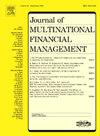金融发展和通货膨胀与财富不平等之间的关系
IF 4
3区 经济学
Q2 BUSINESS, FINANCE
Journal of Multinational Financial Management
Pub Date : 2025-08-28
DOI:10.1016/j.mulfin.2025.100922
引用次数: 0
摘要
自全球金融危机爆发以来,通胀的再分配后果获得了大量关注。虽然收入不平等长期以来一直主导着公共话语,但对于塑造经济机会和政治权力至关重要的财富不平等却相对被忽视了。本文从实证角度考察了通货膨胀对财富不平等的影响,强调了金融发展的作用。我们关注的是最高财富份额,因为最近财富不平等的加剧在很大程度上是由少数精英日益集中造成的。使用跨国面板数据,我们发现通货膨胀加剧了财富不平等,因为它增加了最高财富份额,同时减少了分配的低端财富份额。银行业的发展减轻了这些影响,但股市的发展加剧了这些影响。路径分析表明,这些影响通过企业家精神和资产价格发挥作用。促进银行业发展和扩大股票市场准入的金融改革政策可能有助于减轻通货膨胀对财富不平等的不利影响。本文章由计算机程序翻译,如有差异,请以英文原文为准。
Financial development and the nexus between inflation and wealth inequality
Since the global financial crisis, the redistributive consequences of inflation have gained substantial attention. While income inequality has long dominated public discourse, wealth inequality, which is critical for shaping economic opportunities and political power, has been comparatively overlooked. This paper empirically examines how inflation affects wealth inequality, emphasizing the role of financial development. We focus on top wealth shares, as the recent surge in wealth inequality is largely driven by increasing concentration among a small elite. Using cross-country panel data, we find that inflation exacerbates wealth inequality by increasing top wealth shares while reducing those at the lower end of the distribution. These effects are mitigated by banking development but intensified by stock market development. Pathway analyses suggest that these impacts operate through entrepreneurship and asset prices. Financial reform policies that promote banking development and broaden access to stock markets may help mitigate inflation’s adverse effects on wealth inequality.
求助全文
通过发布文献求助,成功后即可免费获取论文全文。
去求助
来源期刊

Journal of Multinational Financial Management
BUSINESS, FINANCE-
CiteScore
7.30
自引率
4.80%
发文量
25
审稿时长
30 days
期刊介绍:
International trade, financing and investments have grown at an extremely rapid pace in recent years, and the operations of corporations have become increasingly multinationalized. Corporate executives buying and selling goods and services, and making financing and investment decisions across national boundaries, have developed policies and procedures for managing cash flows denominated in foreign currencies. These policies and procedures, and the related managerial actions of executives, change as new relevant information becomes available. The purpose of the Journal of Multinational Financial Management is to publish rigorous, original articles dealing with the management of the multinational enterprise. Theoretical, conceptual, and empirical papers providing meaningful insights into the subject areas will be considered. The following topic areas, although not exhaustive, are representative of the coverage in this Journal. • Foreign exchange risk management • International capital budgeting • Forecasting exchange rates • Foreign direct investment • Hedging strategies • Cost of capital • Managing transaction exposure • Political risk assessment • International working capital management • International financial planning • International tax management • International diversification • Transfer pricing strategies • International liability management • International mergers.
 求助内容:
求助内容: 应助结果提醒方式:
应助结果提醒方式:


